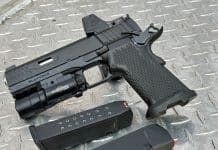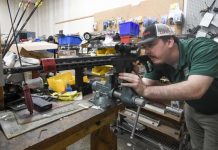National gun control efforts have failed to gain traction. The focus is shifting to State level legislation to both repeal and enact anti-gun rights legislation. Plus, so-called "Smart Guns" are rearing their ugly heads again.
Sociologist Jennifer Carlson recently wrote an opinion piece for the Wall Street Journal with her opinion on the future of guns. She argues that States are the new battleground for legislation and that smart guns are the future.
The most significant development won’t be a nationwide swing toward gun rights or gun control—but a widening and entrenched gulf that will divide Americans politically, socially and even technologically.
Gun-control initiatives will follow the approach blazed by the gun lobby, shifting away from the national stage and focusing increasingly on state-level efforts in places like California, Colorado, Connecticut and Washington. With the gun debate focused on state-level politics, high-profile shootings will exacerbate the division between these two Americas: in restrictive states, a demand for more laws; in permissive states, a demand for more guns.
Polarization will result in greater diversity among gun owners. Aggressive marketing of guns to women, racial minorities and other groups underrepresented within American gun culture is likely (although white men will still predominate). In line with recent survey data, whether one views guns as everyday objects or as a taboo may have increasingly less to do with gender or race and more to do with regional differences and political affiliation.
I completely disagree that smart guns are the future. Politicians have tried to use them to replace our current handguns. Also, the day I have to rely on technology like batteries, microprocessors, or encryption to defend myself is a very bad day.
Gun entrepreneurs will market “smart guns,” which use identification technology like fingerprint recognition to make a firearm inoperable in the hands of unauthorized users. However, these efforts may be counteracted by the proliferation of "disposable" guns, which are inexpensive, untraceable weapons created with 3-D printer technology and which often can be used only a limited number of times because of the materials used.
Smart guns will gain some traction in restrictive states, but 3-D printing technology will appeal to do-it-yourself gun aficionados who love to tinker and to the underground market, which seeks untraceable arms.
* The views and opinions expressed on this web site are solely those of the original authors and contributors. These views and opinions do not necessarily represent those of Guns & Tactics Magazine,
the administrative staff, and/or any/all contributors to this site.












